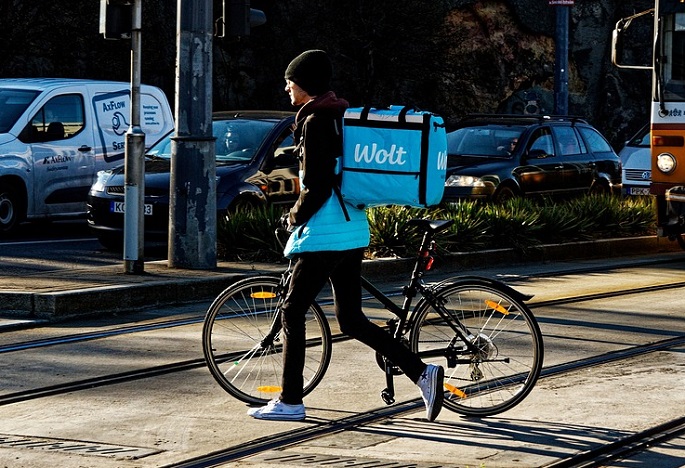App-based work isolates workers from colleagues: study
Published : 23 Feb 2024, 00:55
Updated : 23 Feb 2024, 00:57
A study has found that app-based work the migrants do via the digital platforms is organised so as to separate and isolate them in various ways, said the University of Helsinki in a press release on Thursday referring to the study.
Working as a food delivery driver or cleaner via various digital apps is considered an easy way to access the job market, and the apps are marketed as quick and convenient for users.
The new research highlighted how the apps increase inequality among the workers.
The study tried to find out how the workers are affected when a simple food order took place via Wolt, Foodora or a similar app.
Sociologist Olivia Maury set out to investigate how work is done via the apps, or digital platforms, and what differences they create among the workers and how.
“I focus on migrants working via these platforms, and who also constitute the majority of their workforce. I’m interested in incorporating various aspects of the migrants’ lives and exploring the platforms from their perspective and based on their experiences,” Maury said, raising a question whether the platforms are a problem or an opportunity.
The research was conducted based on interviews with migrants working as food delivery drivers or cleaners via digital platforms.
Some have arrived in Finland recently, while others have been living here for almost a decade. Maury has also used ethnographic research methods, which in practice means that she has tagged along with the drivers or met with cleaners working across multiple locations.
“The platforms are grounded on a kind of entrepreneurial spirit of forcing people to compete against each other for the jobs available. There’s this constant sense of having to work more and faster to earn a better income. As a result, the workers are encouraged to see each other not as colleagues, but as individuals working independently and as effectively as possible,” she said.
While the workers are pitted against each other, other hierarchies and inequalities are also established between them based on factors such as their legal status in the country.
“For example, some workers have been granted a residence permit for just one year, whereas others may have a four-year permit. To renew your permit, you must have sufficient financial resources, which means you must work more and compete even harder for the jobs available. As the platforms thus exert more control over certain individuals, they are put in a weaker position and may feel afraid of speaking out if they are mistreated because they risk losing their jobs and money.”
Maury mentions an added dimension: the racism faced by the workers, which may be intensified by the platform algorithms.
“My interviewees said they sometimes feel customers rate their deliveries or cleaning based on racist ideas and opinions. A lower rating in the app may reduce the worker’s future job opportunities and, thus, their ability to make enough money to extend their residence permit. This way, the algorithms create further differences between individuals,” she added.
The division the platforms create makes it difficult for workers to cooperate and present collective demands to the employer.
Maury said this leads to a paradox. Although the platforms separate workers from their colleagues, the core business idea is that everyone uses the same platforms and operates in a type of network.
“The logic is that the platforms bring people together and that everyone – both customers and workers – collaborates to make the system possible,” she said.
Maury sees it as important to highlight the human labour behind the platforms and the technology enabling them. This is to counteract the idea that things just happen when a customer places an order.
“One of the research participants working as a food delivery driver described the platforms as seeming almost magical: the food just magically appears at the customer’s doorstep. He thought it would be important to pay attention to the workers and their working conditions, including pay, time pressure, immigration status and weather.”
Maury said that using words like magic to describe the platforms is indicative of a discourse where digital technologies are referred to as innovative and revolutionary. She notes that such terms often hide the fact that much of modern technology is built on earlier ways of organising human labour.
“Different types of couriers have been around for a long time, and the use of a platform to distribute their services is just an evolution of the original concept. We shouldn’t automatically assume that all new technology is benevolent.”
By gaining an insight into the interrelationship between platforms and workers, Maury hopes to contribute new knowledge about today’s job market from the perspective of certain vulnerable groups and to pinpoint more general trends in the changing job market.
“I hope my research can help the authorities develop policies and legislation needed to improve the conditions for workers with different types of immigrant status,” she said.
She mentions that the authorities and platform workers may have different views of the changes required.
“Public debate often focuses on whether the workers should be treated as employees or self-employed individuals. But the workers themselves have varying views. Not everyone wishes to be considered an employee. Some people see an employment contract as restricting their ability to work when and how much they want to,” she said.
“To increase the transparency of the platforms, many asked for more guidelines and structures, covering, for example, the calculation of distances and the criteria for payment. These are currently not transparent and place the workers in an unequal position vis-à-vis the platforms,” the researcher added.


